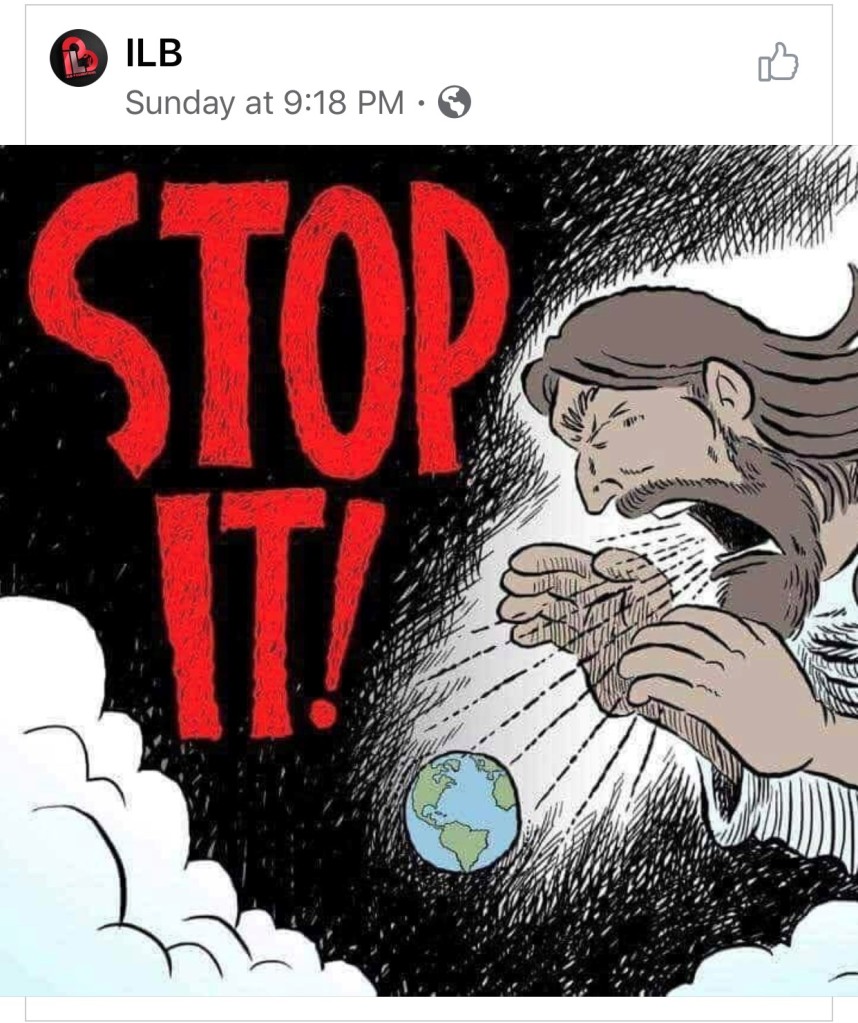People keep asking me if Jesus is coming back soon. Personally, I’m counting on that to happen, but to be honest, God hasn’t invited me into the morning briefings to discuss His timing of future events. I guess my short answer is, I don’t think so. The world has gone through more difficult things previously to this, and God continues to be patient. God’s character does not reflect emotional volatility.
People have been posting this image online multiple times also, but it doesn’t sit well with me.

One of the disturbing things about this image, is that it conjures up the idea that God is emotionally volatile with current political events. It’s not that I don’t believe in the righteous wrath of God against evil, which, by the way, everything God does is righteous, including His wrath. It’s just that . . . God doesn’t lose his temper like we do. The sketch is a very self-projecting emotional drawing.
Concordances of the Bible, which are alphabetical documents of every word in the Bible, will tell you that the wrath of God is articulated even more times in the Bible than the love of God. I know, right?! Take a walk through the book of Lamentations and you’ll see how the wrath of God is displayed.
So, it’s not that I don’t think God displays wrath, that this image is disturbing to me, it’s that the image displays a lack of self-control in God, or a temper-tantrum-throwing-Jesus on display.
You might be thinking, well now, come on . . . Jesus got out of hand when the religious Pharisees were selling items for sacrificial worship at the Temple in Jerusalem, so Jesus started slinging tables around and he even made a whip to drive them from the Temple. You might think Jesus lost his temper there and overreacted to the situation.
One of the incorrect ways people tend to read the Bible, especially historical events like this, is that we often interpret Scripture through our own lens of emotions and apply “this is how I would feel in that situation” type of reading. On top of that, it doesn’t help that most of us have a short temper, (I’ll speak for myself, right dad?), and we overreact to volatile situation ad nauseam.
Did Jesus get angry at the misrepresentation of the worship at the Temple, you bet he did. Was it a temper tantrum, not in the least. Jesus displayed a calculated response against the evil represented by religious legal experts, who for centuries, were misrepresenting God’s character and extorting worshipers to pay money for grace. (Families coming to Temple needed a small living sacrifice as an offering to God. The religious few were profiting off of the sale of these items, to say the least.) These practices of sales were legally binding people in their sins, rather than offering them the grace that Jesus would eventually die to pardon.
Let me say it another way, the Temple incident was a foreshadowing of the sacrifice Jesus would endure on the cross, which would pardon all for their sin (all of our sin). Jesus took the pain and suffering of death upon himself, that would essentially expunge all people of their need to sacrifice something on an altar, asking God to forgive them. In that moment, Jesus may have been inciting the wrath of the religious legal experts upon himself, who would one day unleash their hatred upon him at another Passover weekend.
Back to that image above. I get it. We think God is mad at this whole world for the way we are treating one another, which isn’t good at the moment.
Truth is, God isn’t mad. That image is wrong. Jesus died and pardoned our sin, once and for all. God isn’t mad with you. Your behavior may not be honoring to God, but HE’S NOT YELLING AT YOU (see what I did there?). If anything, God is whispering, like He did with Elijah, and God is asking you to draw close to Him during this difficult time.
Maybe the image is better represented by humans yelling at one another, and God drawing near to us in love.
Maybe this image bothers me because we think God has about had ENOUGH, thank you very much, and He’s yelling at us, “DON’T MAKE ME COME DOWN THERE, YOU STUPID CHILDREN.” God doesn’t see us that way.
God wants us to love each other, and yet the Holy Spirit is grieved that we don’t know how to love one another.
Here’s an idea, what if we stopped YELLING AT ONE ANOTHER OUT OF HATE & HURT, and begin reaching out in love to one another, one person at a time?!
How about we, you and me, stop all the anger and yelling, which doesn’t produce the righteousness God desires anyways, and we learn to love one another.
I think the image of Jesus yelling “STOP IT” at the world is a misrepresentation of God’s character.
I don’t think Jesus is disconnected from the world, the size of a tennis ball, and yelling. Rather Jesus is close, he’s nearby. In fact, Jesus is visibly living in you and me through the personal presence of the Holy Spirit in each of us.
So, when is God coming back? I don’t know.
One thing I do know, however, is that God is not losing His temper. Rather, God is extending His love to you and me, through you and me, into this dark world in need of much grace.







 (click here for the video) The Apostle Paul includes a prayer over the church in Ephesus in one of his prison epistles. This prayer has shaped my life as a pastor for 30 years. It is one of Paul’s crowning jewels in prayer over a little church 2,000 years ago. It’s applicable today in so many ways. Paul prays with a confidence that comes from knowing we can enter into God’s throne room at any time and God will hear us. God’s desire is that we utilize the power of God in our daily circumstances so that we might grasp just how unfathomable are the riches of God for us. If we were to realize the full measure of grace God has granted to us in Christ Jesus, we could change the world. This is Paul’s prayer, that we could know the riches of God in Christ. My prayer for the church is that we might move past ourselves and begin to comprehend our location in the heavenly realms in Christ. Nothing can stop the one who believes in the full measure of God in us.
(click here for the video) The Apostle Paul includes a prayer over the church in Ephesus in one of his prison epistles. This prayer has shaped my life as a pastor for 30 years. It is one of Paul’s crowning jewels in prayer over a little church 2,000 years ago. It’s applicable today in so many ways. Paul prays with a confidence that comes from knowing we can enter into God’s throne room at any time and God will hear us. God’s desire is that we utilize the power of God in our daily circumstances so that we might grasp just how unfathomable are the riches of God for us. If we were to realize the full measure of grace God has granted to us in Christ Jesus, we could change the world. This is Paul’s prayer, that we could know the riches of God in Christ. My prayer for the church is that we might move past ourselves and begin to comprehend our location in the heavenly realms in Christ. Nothing can stop the one who believes in the full measure of God in us.  Philemon was a guy who wanted to seek revenge on a former slave, for some crime done against him. The Apostle Paul sent Philemon a letter, along with the former slave, Onesimus, himself. Paul was asking Philemon to extend the kind of forgiveness to Onesimus that Jesus Christ himself had extended to Philemon (are you still following?). And on top of all this, Paul himself is the one who brought Philemon to faith in God, and brought Omesimus to faith in God also. So Paul is asking Philemon to forgive Onesimus based on the debt he owes back to Paul, “his very life”. I don’t know if we know how to forgive in our western culture, like Paul is asking Philemon to forgive. And even beyond this little book, Paul is asking you and I to learn to forgive like this, so that our witness to the world is like that of Jesus Christ. (click here for video)
Philemon was a guy who wanted to seek revenge on a former slave, for some crime done against him. The Apostle Paul sent Philemon a letter, along with the former slave, Onesimus, himself. Paul was asking Philemon to extend the kind of forgiveness to Onesimus that Jesus Christ himself had extended to Philemon (are you still following?). And on top of all this, Paul himself is the one who brought Philemon to faith in God, and brought Omesimus to faith in God also. So Paul is asking Philemon to forgive Onesimus based on the debt he owes back to Paul, “his very life”. I don’t know if we know how to forgive in our western culture, like Paul is asking Philemon to forgive. And even beyond this little book, Paul is asking you and I to learn to forgive like this, so that our witness to the world is like that of Jesus Christ. (click here for video)

